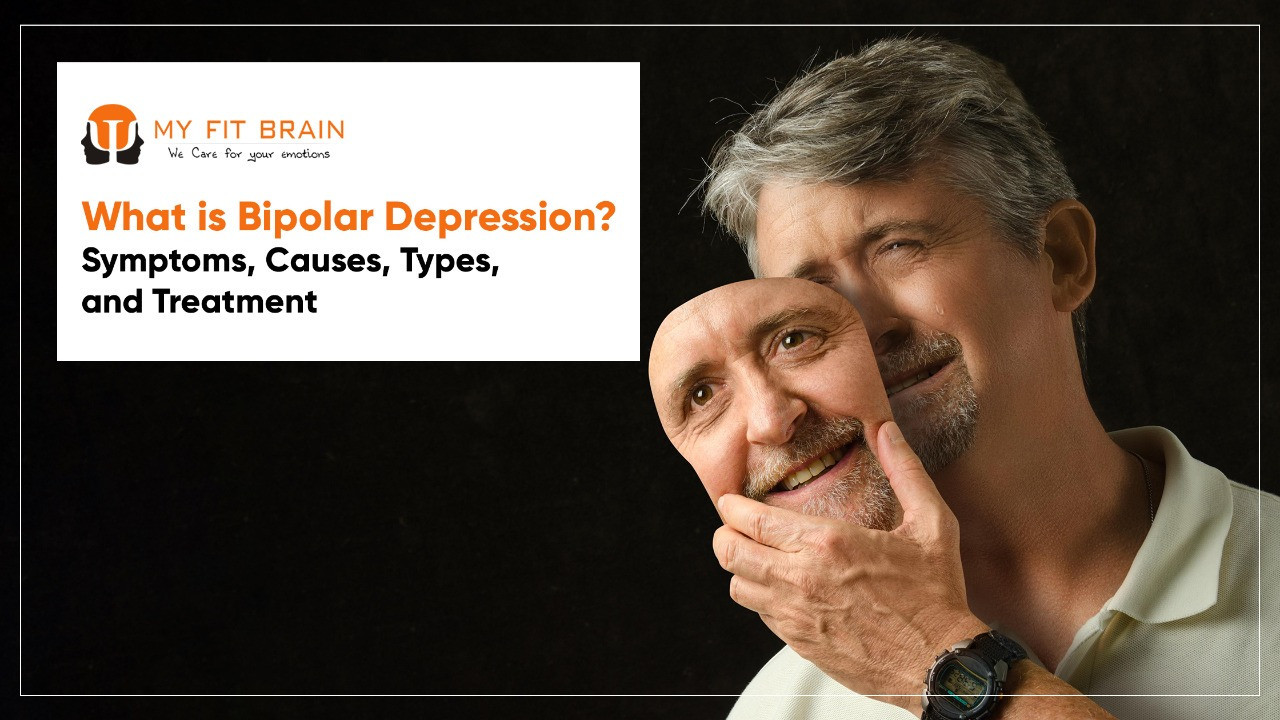Package of 5 Sessions
- Rs.5,999.00/-
This article explains what bipolar depression is, its symptoms and causes. It also covers different types of treatments for it. Read on to know more about this common mental disorder.
 Dr. Neha Mehta
Dr. Neha Mehta  28 Jan 2023
28 Jan 2023  Depression
Depression  2.2k Reads
2.2k Reads  6 min Read
6 min Read 
Bipolar Depression is a serious mental disorder in which the patient experiences variable mood swings, thinking, and behavior. It is also sometimes called Manic-depressive illness or manic depression.
The patients with bipolar disorder experience chronic depression or i.e. called mania. They also experience many variances in their mood. This condition varies from person to person. Some of them may experience a depressed state on the peak while others may experience some sort of maniac attack. It is also possible to experience the above two states simultaneously.
The symptoms of bipolar depression include frequent mood shifts sometimes at an extreme level and sometimes low.
These symptoms may include:
The patients having bipolar depression do not necessarily always show signs of depression or experience Manic episodes but what they actually show is an unstable mood or mood swings. Patients with this disorder generally experience highs and lows in their mood and behavior. The mood can change frequently leading to an unstable mood.
The patient might have poor performance levels in school, social activities, poor job performance levels, low concentration and focusing power, and difficulty in managing relationships. These patients if left untreated might take the step to commit suicide as they may experience intense emotional state i.e. mood episodes.
People with bipolar disorder experience intense emotional states referred to as “mood episodes.”
People with bipolar disorder may experience hypomania sometimes. Hypomania means a low level of mania or less severe condition. This condition is treatable and doesn't affect life on a bad note. Sometimes mania episodes can lead to hospitalization.
Sometimes patients with bipolar disorder may also experience mixed mood and behavior which includes symptoms of clinical depression and maniac depression both. In this state, the person will show the symptoms such as:
These symptoms worsen if left untreated. So it is better to rush immediately to your psychologist if you experience these symptoms in you or your dear ones.

This type of bipolar disorder is mixed with maniac and depressive episodes and these episodes lasts for about one week. In severe cases, the patients may require hospitalization. In the case of Depressive episodes, the symptoms last for about 2 weeks. These symptoms may sometimes be the same as a normal person's behavior.
This type is characterized by a pattern of depressive episodes mixed with hypomanic episodes that lack “full-blown” manic (or mixed) episodes.
This type is sometimes experienced in a person when their symptoms are neither fully like Bipolar I nor fully like Bipolar II. But the patient rather experienced mood swings in comparison to a normal person.
It is a generally mild form of Bipolar Disorder. The person has a mild form of depression with hypomanic episodes that last for around 2 years.
Some patients get diagnosed with Rapid-cycling Bipolar Disorder. In this disorder, the patient experiences in one year of duration as:
This disorder tends to occurrence in people with severe bipolar disorder who has been diagnosed with depression at an early age and tend to affect women at the most probability than men.
Some people experience the symptoms of bipolar disorder on or around the age of 25 while others may experience the symptoms at an early age or later in life. The frequency of symptoms ranges from low to severe depending upon the person. If left untreated, the symptoms get worsen and increase over time.
The thing you need to do is to rush to your psychologist immediately and get it tested and treated. Your psychologist may have some questionnaire round to determine the reason behind this and the severity of the disorder. They will also examine you to know about your alcohol or drug usage. They may also prescribe some laboratory tests to figure out any physical health issues. Most patients only seek help during a depressive episode, but your doctor needs to perform a complete diagnostic evaluation before making a diagnosis of bipolar disorder.
The patients with bipolar disorder may also experience some other sort of physical ailments along with, such as:
Substance abuse problems are also common among patients with bipolar disorder. There is no exact cause known for bipolar disorder, but it tends to extend in families and is hereditary.
Bipolar disorder can't be cured completely. It can only be managed and treated carefully and if the person is unable to manage the environment around him then this disorder turns to return. It is considered chronic like- diabetes that cannot be cured completely but can be reduced only with medication and other methods. Its treatment usually includes medication which includes antidepressant medication to treat depression symptoms in it and psychotherapy both i.e. talk therapy.
_1758801555.jpg)

In today's rapidly developing world, anxiety has become a common challe...
 25 Sep 2025
25 Sep 2025  6 min Read
6 min Read 165 Reads
165 Reads _1758348328.jpg)

A healthy sex life is an integral part of overall well-being and happiness....
 20 Sep 2025
20 Sep 2025  6 min Read
6 min Read 357 Reads
357 Reads 

Each relationship goes through ascents and falls. However, when the argumen...
 15 Sep 2025
15 Sep 2025  6 min Read
6 min Read 436 Reads
436 Reads _1757745126.jpg)

Depression may feel stunning and exhaust your energy and motivation. While ...
 13 Sep 2025
13 Sep 2025  6 min Read
6 min Read 421 Reads
421 Reads 
_1758801555.jpg)
_1758348328.jpg)

_1758801555.jpg)
_1758348328.jpg)

_1757745126.jpg)